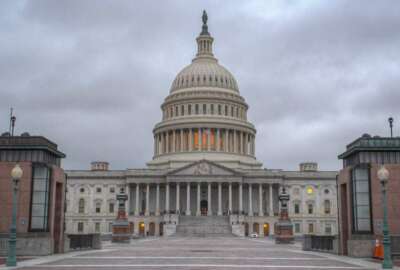
Senate joins House in providing no funding for OPM-GSA merger
OMB acting director Russ Vought highlighted the lack of funding as one of several decisions by the Senate that will impact agencies in the fiscal 2020 consolidated...
The Trump administration’s plan to merge most of the Office of Personnel Management with the General Services Administration looks like it will take another major hit. The Senate joined the House in including no funding for the consolidation in its consolidated appropriations bill for fiscal 2020.
In a letter to the Senate Appropriations Committee, Russ Vought, the acting director of the Office of Management and Budget, made the case once again for the merger.
“The administration continues to stress the need for structural and organizational change at OPM. The status quo is unsustainable, and inaction would maintain an organizational construct that is ill-equipped to meet the needs of today’s modern workforce,” Vought wrote. “The administration is pursuing this needed structural reform to better align resources with mission and create long-term stability, sustainability, and increased operational excellence.”
The Senate didn’t entirely reject the merger in its version of the Financial Services and General Government funding bill. It wrote in the report in September that while it will not allocate the administration’s request, it seems willing to along with the authorizers.
“Should authorizing legislation be enacted that transfers these functions to GSA, the committee stands ready to provide sufficient resources to GSA to facilitate an orderly transition,” the committee’s report stated.
But without the funding–$50 million requested in fiscal 2020—the major pieces to the consolidation will not be possible.
The House in June also rejected the administration’s request, while also adding specific language that would prevent the administration from merging OPM with GSA — or carrying out any agreements that would facilitate further partnerships or shared activities between the two agencies.
Adding another wrinkle to the merger effort, the continuing resolution, which passed and became law in September, included $48 million for OPM to address any shortfalls because the National Background Investigations Bureau and the governmentwide security clearance portfolio transferred to the Pentagon.
USDA relocation gets funding
While it rejected funding for the OPM-GSA merger, the Senate offered a mixed response to the White House’s other plans for reorganizing certain agencies.
For instance, the upper chamber allocated $25 million for the Agriculture Research agency relocation, which would move the Economic Research Service and the National Institute for Food and Agriculture to Kansas City.
Rep. Jennifer Wexton (D-Va.) and 31 other lawmakers from both houses of Congress wrote the House and Senate appropriations committee asking them to block the USDA relocation plans.
“With only a fraction of reassigned employees opting to relocate, we are extremely concerned that moving forward with this relocation will increasingly jeopardize ERS and NIFA’s ability to continue their critical work as well as cause irreparable harm to the federal scientific workforce,” the lawmakers wrote in the Oct. 24 letter.
On the other hand, the Senate will block Customs and Border Protection from moving its Trusted Traveler Vetting operations—located in Vermont—to the National Targeting Center (NTC) in Virginia.
Vought said the relocation already is in progress “as the Vermont location cannot support classified vetting, whereas such vetting can be conducted at the NTC. Prohibition of the move to the NTC poses an increased risk to national security.”
Neither the Senate or the House bills address the Bureau of Land Management in the Interior Department’s planned move to Grand Junction, Colorado.
Vought highlighted another personnel change request the Senate isn’t agreeing to as well.
The administration asked for an extension to 2025 of the Title 42 hiring authority at the Environmental Protection Agency.
“The authority allows EPA to hire up to 50 world-renowned scientists and engineers at competitive, market-based salaries. The current authority expires at the end of fiscal 2020. The 2020 budget requested the authority be extended through fiscal 2025,” Vought wrote.
IT modernization fund zeroed out
On the technology front, Vought expressed OMB’s displeasure over the Senate zeroing out the Technology Modernization Fund. The House approved $35 million, which is $115 million below the administration’s request.
Additionally, the Indian Service Service’s electronic health record (EHR) modernization effort also would receive $22 million less than the $25 million request.
On the other hand, Vought said the administration was pleased the Interior Department would receive the $12.5 million it requested to implement the NewPay technology modernization program.
The Senate also fully funds the administration’s request of $22 million for the National Archives and Records Administration’s electronic records archive program. It also gives the IRS its full request of $11.4 billion, which Vought said would accelerate the business systems modernization program and improve how the IRS interacts with taxpayers and tax professionals.
Copyright © 2025 Federal News Network. All rights reserved. This website is not intended for users located within the European Economic Area.
Jason Miller is executive editor of Federal News Network and directs news coverage on the people, policy and programs of the federal government.
Follow @jmillerWFED





